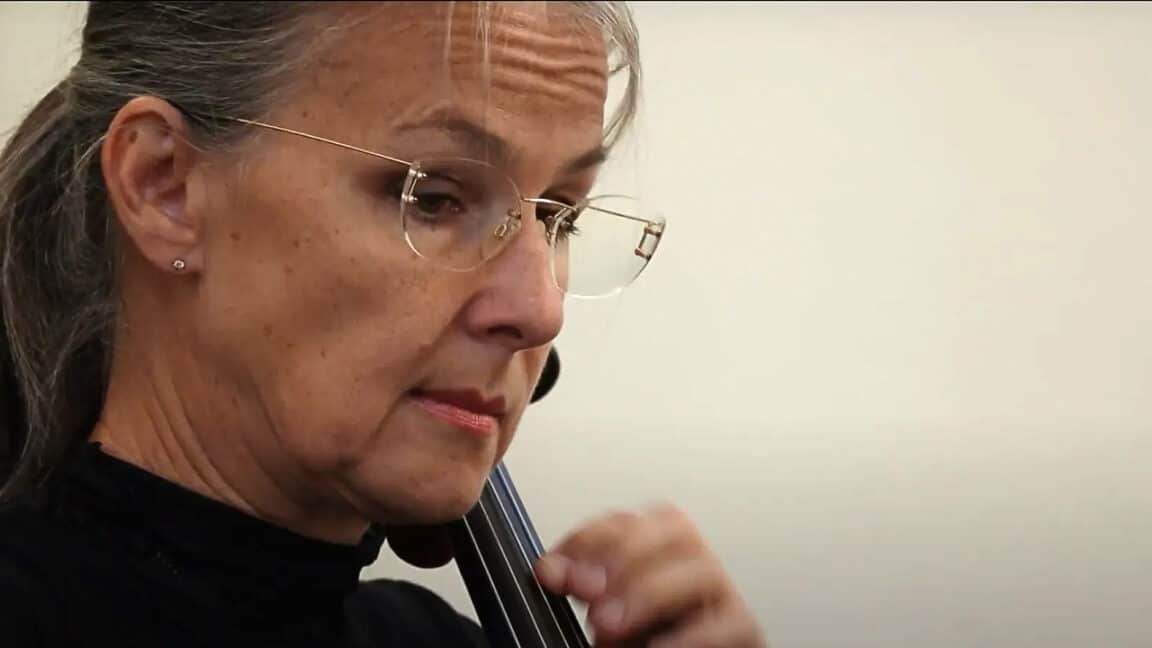The Martinů Quartet traveled from the Czech Republic to Portland to offer us a feast of Antionín Dvořák in five concerts of seventeen different pieces. These concerts were part of the Dvořák Festival presented by Friends of Chamber Music, November 5 through 13. Included in the festival were several free events: two lectures and a pre-concert talk by renowned Dvořák scholar Dr. David Beveridge, as well as a master class, a panel discussion with the Martinů Quartet, and two films. ArtsWatch was fortunate to have a zoom call with the Martinů’s cellist, Jitka Vlašánková to learn more about the quartet and its relationship to Dvořák.
Becoming the Martinů
The quartet was formed in 1976 by four students of the Prague Conservatory who advanced rapidly in their field, winning seven prizes at international competitions, including the famous Prague Spring Festival competitions. Vlašánková joined the quartet later, but describes their early story: The quartet enjoyed playing the music of Bohuslav Martinů, but in the times before the revolution, string quartets were not allowed just to pick the name of any composer, so they settled on the name of their first violinist, Lubomír Havlák. Later, they were offered their current name by the Bohuslav Martinů Foundation, and they were happy to accept it and align themselves with the great Czech composer. Between 1995 and 1997 they released the complete string quartets of Martinů in three volumes on Naxos.
The Martinů Quartet is one of the most accomplished string quartets in the Czech Republic, known for the remarkable number of string quartets in this small country about the size of South Carolina. When asked why there are so many well known string quartets in such a small country, Vlašánková admits that a there may be a higher percentage per capita, but that they were not necessarily special as there are many wonderful quartets in Europe and America. She maintains that during the time of the Soviet occupation young musicians didn’t have the opportunity to present paid concerts as they did in the West, and therefore they had more time to focus on rehearsal. And they did a lot of rehearsing! “The string quartet is a very delicate ensemble,” she observes. “It is a special medium, an ensemble that needs a lot of rehearsal, much more, let’s say, than a piano trio, which is an ensemble of three soloists, where they meet, they play, and that’s it.”
Martinů and Dvořák — Common roots
When asked about whether playing so many concerts of music all by the same composer could be tiresome, Vlašánková is adamant: “Getting tired of Dvořák? It is not possible! Such an extraordinary composer, and the quality is absolutely superb! Would you say that you would get bored with Bach or Beethoven? This is the thing: The more you play it, the more you understand, the more you can get deeper into the music.” There’s no chance she will get tired of playing Dvořák!
Although Bohuslav Martinů’s productive period occurred several years after Dvořák’s death, Vlašánková points out the connections between the composers. It’s not so much a matter of direct influence, but that both composers were “brought up with the the same folk music, the same melodies, rhythms, and dances. So very definitely the roots are the same and you can hear it in their music.”
The cello’s role
According to Vlašánková the beauty of the string quartet is that each part plays a very important role. She describes the relative positions of the cello and the first violin as a kind of outer structure supporting the inner voices, the second violin and the viola. To describe the cello’s role, she says that in the Czech language they say “the base confirms the music.” In the early days of Haydn, the first violin was the quartet’s star, and in later years the other instruments seem to catch up. “The more you go toward the 20th century, the more the role of all the voices becomes equal.” But the cello is the base and “it makes the solid platform.”
Why chamber music?
Asked why she chose chamber music instead of other pursuits, Vlašánkov replied, “Well, chamber music is the kind of music which everybody would like to do. Even the big names turn to chamber music and enjoy it.” She tells how people who have retired from important positions in an orchestra come to her university’s chamber music courses and enjoy playing and being coached in chamber music. “You are not alone when you are playing chamber music, not only on the stage, but you are not alone in the process of preparation for concerts. But still you are unique.” It’s not like being in an orchestra where you are sitting among a group of celli, and if you don’t show up, it’s not that much different. “But each person in chamber music is unique and needs to perform 100%!”
In addition to recordings of the great classical composers Mozart and Beethoven, and the Czech masters Dvořák, Janáĉek, and Martinů, the Quartet has recorded some contemporary American composers, such as Elliott Miles McKinley’s quartets numbers 4-7, and all 12 of Tomáŝ Svoboda’s string quartets, Svoboda being a much admired Portland resident.



